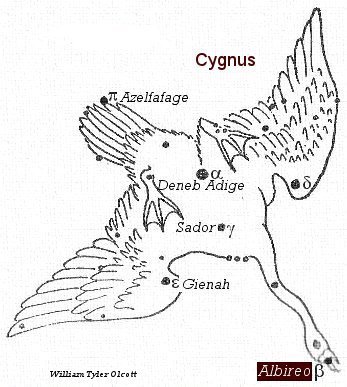| Fixed star: ALBIREO | |
| Constellation: Beta (β) Cygnus | |
| Longitude 1900: 29CAP52 | Longitude 2000: 01AQU15 |
| Declination 1900: +27.45′ | Declination 2000: +27.58′ |
| Right ascension: 19h 30m | Latitude: +48.58′ |
| Spectral class: K1 | Magnitude: 3.2 |
The history of the star: Albireo
from p.196 of Star Names, Richard Hinckley Allen, 1889.
[A scanned copy can be viewed on this webpage

Albireo, the now universal title, is in no way associated with Arabia, but apparently was first applied to the star from a misunderstanding as to the words ab ireo in the description of the constellation in the 1515 Almagest. Albireo in the Standard Dictionary undoubtedly is from a type error, as also may be Abbireo, Alberio, and Albeiro, which occasionally are used.
The Arabians designated beta (β) as Al Minhar al Dajajah, the Hen’s Beak, where it is still located on our maps. Menkar Eldigiagich and Hierizim were other titles.
Beta is one of the show objects of the sky, and its colors described as golden and azure, and “perhaps the most lovely effect of color in the heavens.”
Star Names, Their Lore and Meaning, Richard Hinckley Allen, 1889].
A symbolic title for Albireo was “The song of the dying swan” [Robson, p.118.]
The astrological influences of the constellation Cygnus
Legend: Cygnus, the Swan, represents Zeus/Jupiter, who seduced Leda, queen of Sparta, in the form of a swan. The same night Leda slept with her husband Tyndareus, the King of Sparta. In some versions, she laid two eggs that produced four offsprings; one, fathered by Zeus and producing Helen of Troy and Polydeuces, or Pollux, one of the Gemini Twins; from the other egg fathered by Tyndareus was hatched the other Gemini Twin, Castor, and Clytemnestra.
Influences: Cygnus gives a contemplative, dreamy, cultured and adaptable nature. The affections are ill regulated and unsteady, the talents develop late. There is some love of water and swimming and the arts. By the Kabalists it is associated with the Hebrew letter Resh and the 20th Tarot Trump “Judgment”. [Robson, p.42.]
The astrological influences of the constellation Cygnus given by Manilius:
“Hard by is the place allotted to the Swan: as a reward for the shape with which he [Jupiter or Zeus] snared the admiring Leda [see Leda], when, a god changed into a snow-white swan, he came down and offered his feathered form to the unsuspecting woman. Now too with outspread wings it flies among the stars” [Manilius, Astronomica, 1st century AD, book 1, p.31.]
“Its down and glittering wings figured by stars. Accordingly he who at its rising leaves his mother’s womb and beholds the light of day shall make the denizens of the air and the race of birds that is dedicated to heaven the source of his pleasure and profit.
“From this constellation shall flow a thousand human skills (artes): its child will declare war on heaven and catch a bird in mid-flight, or he will rob it of its nestling, or draw nets up and over a bird whilst it is perched on a branch or feeds on the ground (swans had a reputation for being hostile to other birds). And the object of these skills is to satisfy our high living. Today we go farther afield for the stomach than we used to go for war: we are fed from the shores of Numidia and the groves of Phasis; our markets are stocked from the land whence over a new-discovered sea was carried off the Golden Fleece. Nay more, such a man will impart to the birds of the air the language of men and what words mean; he will introduce them to a new kind of intercourse, teaching them the speech denied them by nature’s law.
“In its own person the Swan hides a god (as being in the disguise of Jupiter) and the voice belonging to it; it is more than a bird and mutters to itself within. Fail not to mark the men who delight to feed the birds of Venus in pens on a rooftop, releasing them to their native skies or recalling them by special signs; or those who carry in cages throughout the city birds taught to obey words of command, men whose total wealth consists of a little sparrow (for such performing birds).” [Manilius,Astronomica, 1st century AD, book 5, p.331].
The astrological influences of the star Albireo
Of the nature of Venus and Mercury. It gives a handsome appearance, neatness, a lovable disposition and beneficence in despair. [Robson, p.118.]
References:
Fixed Stars and Constellations in Astrology, Vivian E. Robson, 1923].